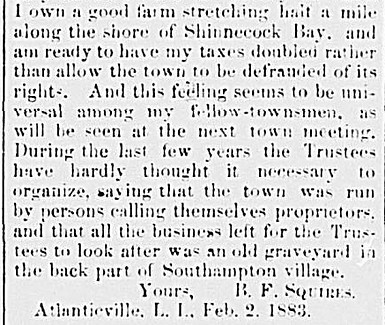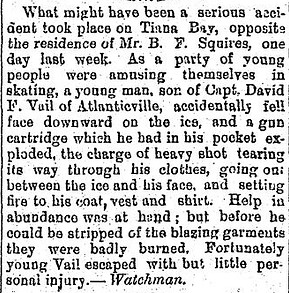top of page
East Quogue Historical Society
P.O. Box 174 East Quogue New York
History of the Pine Grove House
Written by Connie Schneider
Formatted for the website by Sarah Mendenhall Luhmer

Atlanticville, Long Island August 1887
About the 1800's Benjamin and Minerva Squires bought a big piece of land extending from the crick, now in Pine Neck. On this land they built the Pine Grove House.
The original house consisted of a living room, dining room, kitchen, two bedrooms over the kitchen, six bedrooms on the second floor, and five small bedrooms on the third floor.

The Drive to the house was very long and willow trees were planted down it. In the summer it was beautiful driving up to the house.
The House got it's name from the huge grove of pine trees nearby. Since the pine trees did not shed their leaves, it made a pretty park to sit in.














From 1898 until 1930, the Pine Grove House was owned and managed by John and Adelaide Tunnell. During their ownership many improvements were made. This was the golden era of the Pine Grove House. People all went to the seashore for vacations, and money ran freely.
.jpg)
The transportation from New York City to East Quogue was the railroad. It was not very comfortable as it was bumpy and dirty. The boarders got off the train at Quogue station and from there could take a stage coach drawn by horses to the Pine Grove House.

To go into town for supplies and mail a horse and wagon was used. Mr. Tunnell went into East Quogue two or three times a week. He often took some of the borders in with him as it was their only means of transportation.


About 1918 cars became more common. The old stagecoach was discontinued and Dobbin was turned out to pasture. Many of the boarders still came down by train, however. Mr. Tunnell would pick them up in his Buick.
The season started at Easter time and lasted until the middle of November. When boarders came they usually came for the whole summer. Once they were at the Pine Grove House they rarely left except to go into town. Vacation was a time to rest and relax in the sun. In the fall the hunters came for the hunting season. There were always plenty of duck or deer around and no hunting restrictions or limits.





Whole families of five and six would sleep in one room. There would be a large bed for the parents and cots on which two or three children would sleep in each room.
At times there would be up to eighty-five people staying at the Pine Grove. All of the food was cooked and raised by Mr. Tunnell and his sons. They raised cows, chickens, pics and a few sheep. Out back was an orchard in which apple, peach and pear trees. Mr. Tunnell also supplied other people with vegetables. Corn was sold to the Walker House of East Quogue and to the Tiana Pavillion on the ocean. Flour, coffee, sugar and other such commodities were bought.







Up until 1912, there was no electricity in the house. Guests and staff had light by kerosene lamps and heat with fire places. In 1912, when Mr. Tunnell had electricity put in the highest wattage in a bulb was fifteen watts. He was the first person in the vicinity to have electricity, and people came from miles around to see how it worked.
There were no bathrooms in the house at this time. Out back there was an outhouse. It had a partition down the middle with a seat on either side. One side was for the ladies and one for the gentlemen. For emergencies during the night, a slop jar was kept under the beds.






There were always plenty of sailboats for racing. The house had some small ones to be used, butif you wanted your own, you could rent it in town. A course would be set up, and the bets would be made.
At night everyone would gather around the piano and sing or dance to the music. The popular tune was a French tune called "Too much Mustard". Sometimes they would have a masquerade party in the parlor. Everyone would get dressed up, and there would be music and games.




In 1957 the Pine Grove House was still standing. There were changes to the laws that governed boarding houses, limiting the amount of persons who could stay and eliminating the use of the third floor rooms. Additionally East Quogue and surrounding towns had become built up, that guests who drove themselves to vacation at the Pine Grove House could leave the property to find entertainment.
The golden era of the house had passed, and it was not to return.




bottom of page